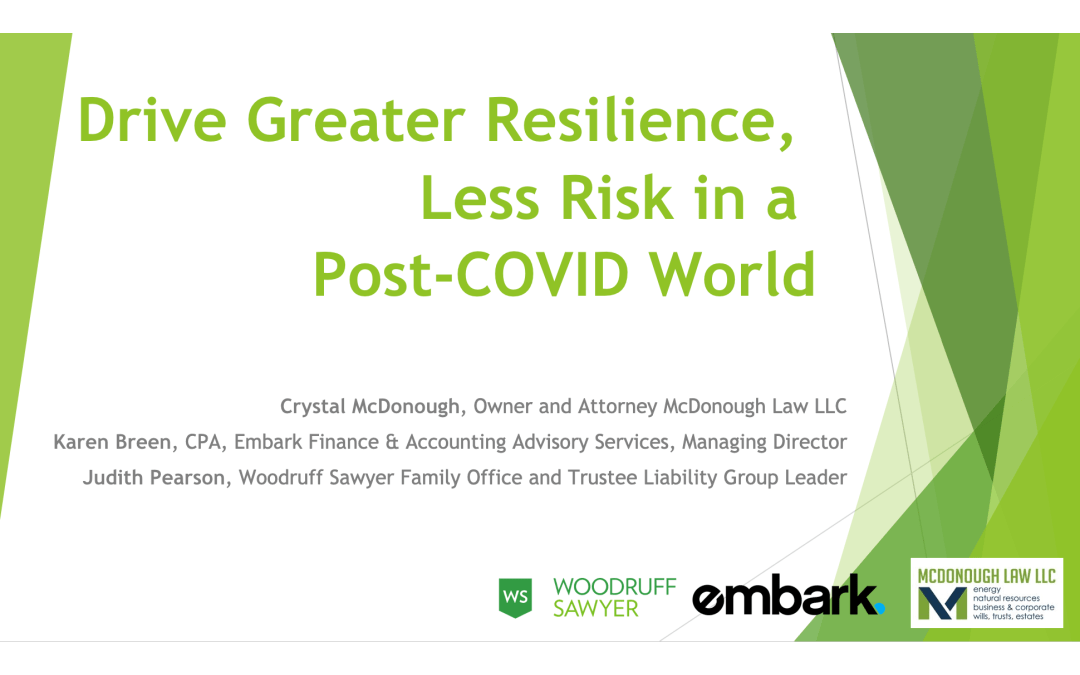Drive Greater Resilience,
Less Risk in a
Post-COVID World
Click here to view video with more details and information.
Crystal McDonough, Owner and Attorney McDonough Law Group
Karen Breen, CPA, Embark Finance & Accounting Advisory Services, Managing Director
Judith Pearson, Woodruff Sawyer Family Office and Trustee Liability Group Leader
Don’t Become a Statistic
1. Business Stress Test™
– Legal, Risk, Finance
2. Get out of the Firefighting Mode that COVID created.
3. Seize Control of Your Insurance Program
– Understanding the current insurance marketplace in the context of historical challenges.
– New world new risks.
Business Stress Test™ – Legal
According to a 2014 Forbes article, between 36% and 53% of US businesses are involved in at least one legal or court proceeding in any given year.
Many of those businesses are sued by employees, contractors, vendors, clients, customers, and even business partners.
What’s even more concerning is the fact that many of these legal issues and disputes could be prevented, or at least minimized, with the proper legal planning and compliance.
It is important to do a thorough review of your operations, procedures, and legal documents to identify any holes or weaknesses that are leaving your business vulnerable to liabilities, lawsuits, and other disputes.
Regulatory Compliance Ever Changing Rules (federal, state, local, etc.)
Return to work policies and potential claims.
Layoffs may increase as stimulus packages and PPE loans go away – may trigger alleged wrongful termination, demotion, or failure to promote an employee.
Families First Coronavirus Response Act (FFRCA) requires employers to receive paid sick leave.
Family & Medical Leave act (FMLA)
Negligent in adhering to employment-related policies and procedures, such as improper training.
Americans with Disabilities Act (ADA) how will long haulers be classified? What accommodations must be made?
Privacy and HIPPA laws
Worker Adjustment and Retraining Notification (WARN) Act claim for unpaid wages.
OSHA guidelines
Will your company require vaccines?
Yes, but some employees may be excluded.
- Employees with disabilities.
- Employees with sincerely held religious beliefs.
- Employees covered by collective bargaining agreements.
What accommodations must be provided?
Can I require proof of vaccinations of employees and guests?
How does this affect my employment practices, fiduciary liability and workers compensation policies be affected?
Business Stress Test™ – Risk
Seize Control of Your Insurance Program
Understanding the current insurance marketplace in the context of historical challenges.
New World New Risks
While the magnitude of D&O claims isn’t different the types claims are challenging.
Adequacy of disclosure in your financial/business environment.
Balancing and prioritizing diverse and complex interest of stakeholders (shareholders, employees, customers, beneficiaries).
Regulatory compliance
Reputational risk
Business Stress Test™ – Finance
Build RESILIENCE & REINVENT How Finance Teams Operate
Cash Remains King!
Optimize Working Capital.
Don’t just focus on P/L at the expense of the balance sheet.
Accelerate receipts, manage inventory turn, extend payments.
Review tax planning and seek accelerated refund claims.
Current ratio above 1.0 is key.
Always Be in a State of Finance Readiness
GAAP vs cash basis financials.
Agile Forecasting – run multiple scenarios, stress test debt covenants.
Ensure financials enable a lender or investor to understand your business.
Sell side due diligence – act as though you’re going to sell and prepare the documents that a buyer would be interested in.
Revenue, Expenses, Margins, Trends, Client Concentration, Forecasts, Working Capital, etc.
Finance Automation is Front and Center
Reduce Time to Close = Better + More Timely Decision Making
Digital Transformation.
Automation of manual processes.
Integrate Disparate Systems – Move out of Excel!
Data analytics, Dashboard/Management Reporting.
What gets measured gets managed.
Why do it? Per KPMG 2021 Report
A transformed finance function transformed can deliver:
45% cut in general accounting costs.
15% improvement in working capital.
50% reduction in manual reconciliations.
Digitization of the Workplace – Legal/Risk
Contracts and Agreements
Subcontractors’ vs Employee agreements, vendors, leases, licenses, etc.
Cyber: Combination of Increased Threats, Cyberattacks and Malware Continue
in Remote Workplace
1. Lack of two factor authentication.
2. Cloud based breaches.
a. Misconfigured security measures.
b. Lack of monitoring security.
3. Employee connectivity not as robust as corporate environment.
4. Cyber security staffing (4 million cybersecurity jobs unfilled).









